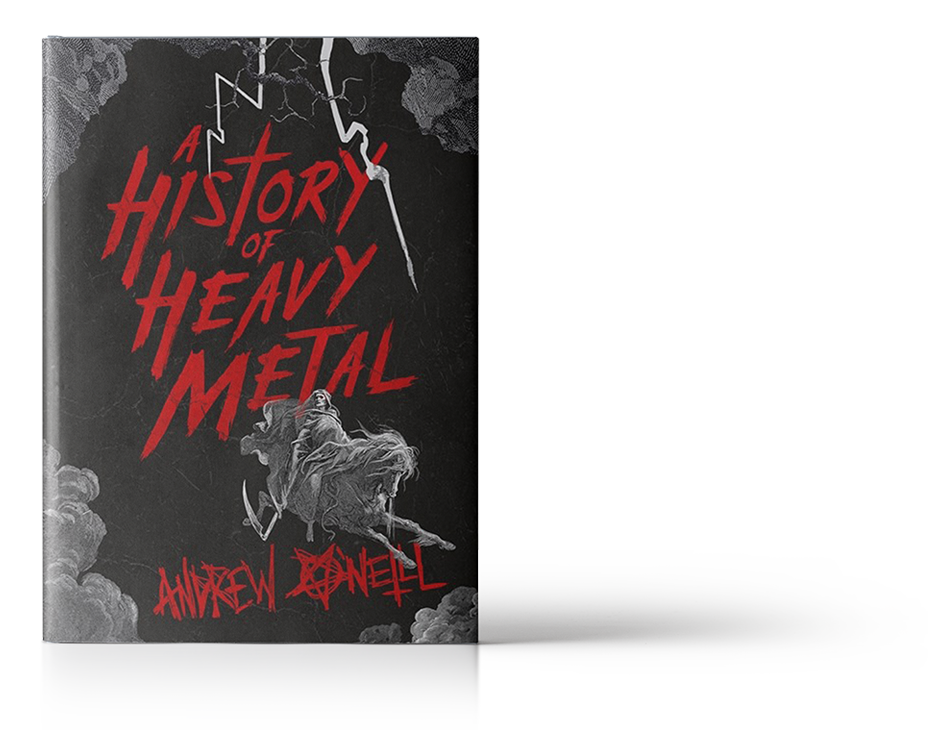Andrew O’Neill is a comedian who for several years has been performing a metal-themed stand-up routine, out of which this book developed. The chapters are packed full of jokes, footnotes and personal anecdotes which are very very funny. But beneath the light tone lies a deep reverence for metal, and beneath that passion lies an encyclopedic knowledge and a balanced approach.
O’Neill takes us through the history of metal with remarkable clarity. As you might expect from a stand-up comedian, he has brilliant story-telling ability, and while he’s aware that most of his readers will be seasoned metalheads already, he’s careful not to alienate non-metal readers too much. I regard myself as pretty well clued-up on the history of metal, but it is very comforting to have one’s favourite subject distilled on the page in this way. I also learnt a lot; O’Neill certainly sorted out the history of black metal for me, and throughout the book highlighted bands and albums I really need to catch up on (Converge, Tool, Neurosis- must must get round to listening. I know, I’m ashamed).

He makes a decent stab at addressing some of the controversies that metal has faced and continues to face; notably, the issues surrounding bands who are a bit (or a lot) racist or homophobic. Metalheads sometimes have to ask themselves, more so than fans of many other cultural forms, whether they can separate art from artist. O’Neill is honest about his struggles on discovering that certain metal musicians he had revered were, well, not very nice people.
Another hot topic in metal recently has been cultural appropriation: that is, celebrities wearing the t-shirts of metal bands they have never heard of. It’s usually Kim Kardashian or Kanye West, and it causes a storm of social media tirades every time it happens. O’Neill gives the best explanation I have read yet of why we metalheads find it really annoying. He also gives an excellent analysis of the state of metal today and how the internet has profoundly changed the practices of both bands and listeners.
There’s a lot of swearing and shouting in this book, but it’s all done in a joyful way, and I found the tone pitch-perfect. O’Neill is a good writer and has some lovely use of evolutionary metaphor and analogy when explaining how subgenres develop. I certainly don’t agree with everything he says. He doesn’t rate Megadeth or Testament, and he doesn’t even mention my favourite band Children of Bodom, which is a scandal that I demand be rectified in the second edition. I think he’s a bit harsh on metalcore and post-metal subgenres. But what would metal be if we all agreed? Half the fun is arguing furiously about who is good and who is shit.
Over the past couple of years I’ve read just about every book there is on metal, including many academic works from the burgeoning field of ‘heavy metal studies’. My husband is a professor and I used to be a research fellow, so I’m familiar with academia and aware that having a university position doesn’t necessarily mean you’re not an idiot. While there’s some incredible metal writing out there, there’s also some absolute drivel purporting to be analysis, and in terms of clarity and insight O’Neill’s informal book stands head and shoulders above everything musical that I’ve read recently. A few months ago I wrote a piece for Broken Amp magazine on ‘Ten Intelligent Books About Metal’, and if I could write it again I would absolutely add this.
O’Neill is currently performing at the Edinburgh Festival, and I will definitely try and catch his live show soon. But most of all: Andrew O’Neill please can we go to the pub together and talk about metal for fifteen hours? I miss your book already!



